
Stellaris Preview
“Paradox grand strategy in space” sounds more like a fan’s hopeful dream than it does a reality. For a development team that has, for 15 years, been focused on replicating the past, the idea that they would try to create a game set in the distant future always seemed difficult to believe. Yet here we are, in 2015, with Paradox Development Studio hot off the heels of its two most successful games ever, announcing a new grand strategy game that is indeed set in space. Stellaris is looking every bit the classic strategy title that we’ve come to expect from the veteran developers, but also an incredible evolution of the formula that has served Crusader Kings II and EUIV so well. While many fans of these games could well be stunted by the unfamiliar setting, this is very much the same incredible sandbox of intrigue, diplomacy and warfare.
Seeing a live gameplay demo at this year’s gamescom, the first thing to notice is the incredible scale of the game. Stellaris takes place over a sprawling procedurally generated world (universe?) map that incorporates seemingly thousands of individual planets, moons and suns. What’s really impressive is the seamlessness of it all, even at this stage in the game’s development. You can simply zoom out from viewing one individual planet to seeing the whole universe in a matter of seconds. Of course, that’s nothing new from the Paradox team, but in the beautiful expanse of space, it feels like something completely different. Just the impressive scale of the thing is the initial indication that Stellaris isn’t one of the numerous space 4X titles already available.
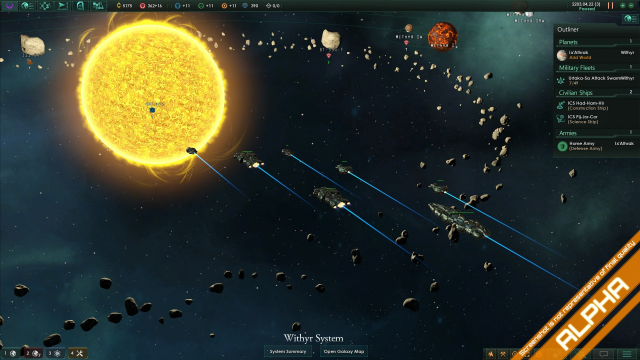
The crux of the game is relatively simple: create your own space-travelling race, set them up on a home planet, and extend your power across the galaxies from there. As in all previous Paradox grand strategy titles, that power can be gained through numerous means; be it through economic and trade means, diplomatic subtleties, military might or any combination of these primary paths. While Stellaris’ exterior is more than a little unfamiliar, the game underneath is classic Paradox. Diplomacy can be conducted with any nation, and the options will be just as wide-ranging as those available in EUIV and the like. The ability for the player to hugely manipulate the world stage was always an important part of those games, so it’s great to see diplomacy return to the fore in Stellaris.
The real-time gameplay will also feature, with players speeding up and slowing down time in classic form; even the UI was pleasantly familiar. In reality though, that’s where the comparisons stop; while the beating heart of Stellaris was clearly cloned from previous grand strategy games, everything else feels fresh and hugely exciting. An ethics system, for instance, that tracks the ethical direction of your race regarding factors like treatment towards aliens or choice in technological development. Thankfully there’s no scale between ‘evil empire’ and ‘most holy harbingers of peace’, instead the ethics of your empire will have an effect on your population. Kill too many alien races and the portion of your people who support inter-species relations will start to get unhappy. How intricate this system will be is unclear at this point, but it seems like a fantastic addition to the typically po-faced nature of these games.
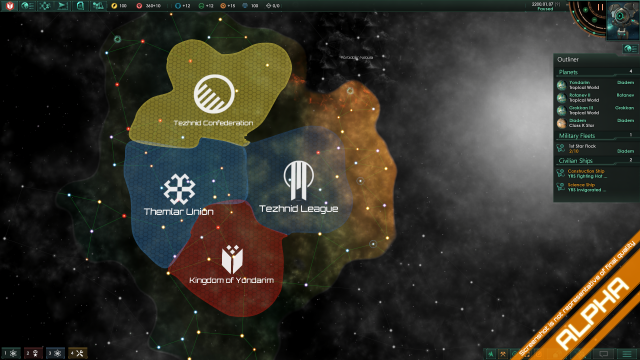
In fact, the way you manage your own people in Stellaris is very different to previous games. Citizens play into an unusual system in which production on your home planet is managed through a boardgame-esque tile placement game. The details were a little hard to gather from simply watching, but it looks as though players can build one building per tile, but by placing certain buildings next to one another bonuses can be granted. Then, each tile houses one citizen whose opinions and ideas add towards the public ethical views aforementioned, as well as other gameplay elements. I didn’t quite catch all of the details on this mechanic, but it’ll certainly be interesting to learn more on how it fits into the game at large.
Another element that’s rather unusual for a Paradox grand strategy game is story. Admittedly, past games have always been about writing your own story for the nation you take under your wing, and Stellaris is no different. This time however, actual written narrative comes to the fore. By exploring the universe with your scientists and armies, you’ll come across events that piece-by-piece tell the story of your faction with a particular focus on its origins and how it came to be. It sounds fascinating, but the challenge will be for Paradox to keep the mechanic fresh over the course of inevitable hundreds of hours of gameplay. Events aren’t all based on learning about the past though, it’s possible to trigger events that could cause you serious problems - like asteroids. These random events perfectly demonstrate how moving away from historical accuracy can really help Paradox flex their creative muscles, and I’m really happy to see it.
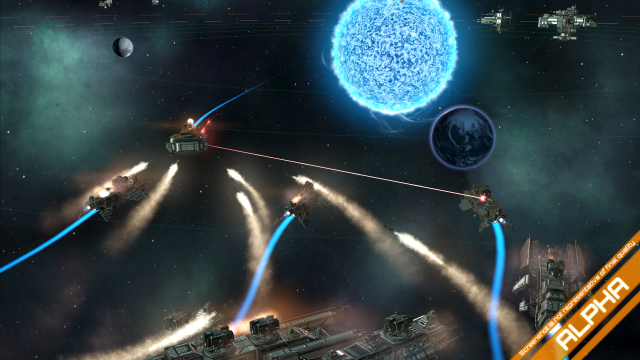
That sense of creativity is spread to the player as well; Stellaris is shaping up to be much more customisable than any previous grand strategy title. For starters you’re able to create your own race and associated faction at the beginning of the game; not jumping into a historical scenario means each game will be randomly generated, and for the first time Paradox has made a game in which everyone starts on level pegging. No more France and its endless domination of everything. So your race’s appearance, traits and initial ethics can all be toyed with before starting, and with the AI using the same system, every game will feature new factions and races that you’ve never encountered before. It’s also possible to customise the ships that your race uses to traverse the galaxies - or, you know, wipe out other races. The possibilities look near endless, providing yet another way to tell your own story within the game.
The way those ships look is important too, because you’re going to be looking at them quite a lot. Combat in Stellaris is a bold new step for Paradox. Although control in battles will not be given to the player (as with CKII etc.), this time you can watch space battles play out in cool cinematic style. The number-crunching that underscores all Paradox fights is still in place, but now you’ll be able to literally see the effects of your military planning. You can skip or speed up fights if you know who’s going to win or aren’t interested, but I’m sure that it’ll be fantastic to see your own customisable fleet of ships take on a new enemy every once in a while. It’s just another great way to get the player more involved with the actions of his or her empire; bringing the game world to life in the process.
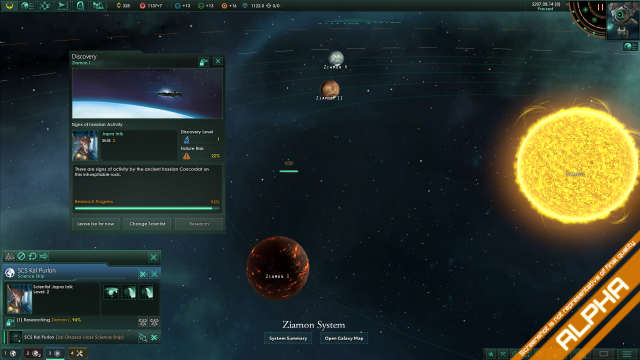
All of this incredible stuff comes alongside other cool things I noticed, like a tech tree that doesn’t look terrible (sorry CKII, but that tech system is awful), as well as a sort of intergalactic UN that can be set up between different alien races and used to peacekeep the universe. Oh, and there’s the fallen empire mechanic that sees certain large factions across the map dissolve into a fallen state, where they become highly dangerous, but far less technologically capable than they once were. Or you’ve got the ‘major galactic crises’ that are caused by one faction becoming far too powerful, resulting in events that conspire to bring them down. These can range from simple things like everyone declaring war on them, or hopelessly awesome things like robots turning on the faction and starting an insurrection. A machine empire in a Paradox grand strategy game is just too much for me to handle.
Long story short: Stellaris already looks incredible. No release date was mentioned during the demo, so we’re probably a fair way from release (my guess would be around late next year), but even now there’s just too much good stuff to comprehend. Considering the brilliance of previous Paradox Development Studio games, it’s easy to trust that they’ve got this under control. While Stellaris is unfamiliar territory for them as much as the game world will be for the player, it’s hard not to look at everything they’ve already announced and simply know that they’ve got something special here.





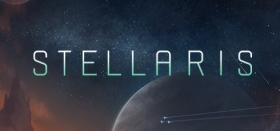







COMMENTS
Rasher - 07:01pm, 24th August 2015
Looks like Paradox have done it agian, another great title
Mister Woot - 08:39pm, 24th August 2015
There's now drool in my keyboard...
domdange - 08:47pm, 24th August 2015
Only drool? you've gotten off lightly
Governor of Idaho - 08:43pm, 24th August 2015
This is bullshit everyone knows the community wanted a potato-based grand strategy instead of this. So disappointed.
Ivanicus Augustus - 11:31am, 25th August 2015
No, they should have made one about Michigan dominating the rest of the United States. Like the Great Automotive Empire or something like that. :D
Idaho potato farmer - 12:47pm, 25th August 2015
What a giant let down, paradox does not even bother to listen to the community. Have you SEEN the demand for a potato grand strat? Nobody fkn wanted this casual space shit!
Rasher - 03:03pm, 25th August 2015
what sort of shaped potato?